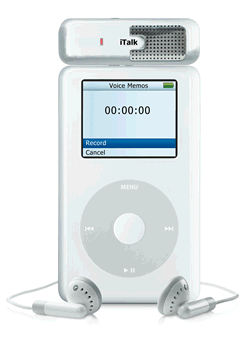 In the summer of 2006 Library and Information Services (LIS) in collaboration with the Language Schools continued the iPod pilot program that was initiated in the summer of 2005 to explore the efficacy of iPods as tools for second language acquisition. iPods with iTalk voice recorders were given to students and faculty in selected programs of study and more existing curricular material was modified for iPod delivery.
In the summer of 2006 Library and Information Services (LIS) in collaboration with the Language Schools continued the iPod pilot program that was initiated in the summer of 2005 to explore the efficacy of iPods as tools for second language acquisition. iPods with iTalk voice recorders were given to students and faculty in selected programs of study and more existing curricular material was modified for iPod delivery.
iPods with iTalk voice recorders were given to students and faculty in selected programs of study in the French and Chinese Schools. In addition, some iPods were reserved for the Russian School. Students and faculty were encouraged to use their own iPods if they had them.
Chinese School
The Chinese School has an excellent collection of curricular material that accompanies their first year textbook, Beginning Mandarin Chinese. This material was reformatted in 2005 for use on iPods. The collection consists of about 3000 audio files, very granular in nature, with each file representing a single vocabulary item or line of dialogue. All of these files have full metadata accessible from StudyDB, our system for delivering lexical databases for less commonly taught languages including Chinese, Japanese, Russian and Arabic. Given the challenge faced by first year Chinese students to learn an entirely new way of representing words, that of pictographs, ideographs and semantic-phonetic compounds, as well as developing a ear for 5 tonal variations, these students need to spend a large amount of time listening to Chinese in a systematic way.
To prepare these files for use on iPods in 2005 we extracted the metadata from the StudyDB lexical database and embedded it in the individual audio files. Based on feedback from students, we reformatted these audio files in the following ways:
- Extended length of short audio files:
The audio files for individual vocabulary items were very short making it difficult to control playback. Thus we increased the length of these files by adding silence to the end of the file so that students would have time to pause the playback - Added repetition to vocabulary audio files:
Vocabulary audio files were also extended by adding repetitions of the vocabulary item separated by silence. This allowed students to hear the item, repeat it, hear is again and repeat again. Each vocabulary item was repeated 3x. - Multiple representations of vocabulary items included in the metadata:
While vocabulary items are playing, students can see how these items are represented in English translation, in Pinyin transliteration, in Simplified and in Traditional characters. These representations were put into the title field of the audio file and in the original formatting created in 2005, four versions of the audio files were included for study, each version showing a single representation of the item. These were reformatted in 2006 so that any given version had at least 2 representations of the item. Thus we had a version in which both the English and Pinyin transliteration were displayed; another version in which both Pinyin and Simplified characters were displayed; a version in which Simplified and English were displayed together; and a final version that included both Traditional and Simplified. Combining there representation provided a richer context for these audio files and allowed students to compare representations while listening.
The French School has used the popular French in Action textbook series for a number of years. Middlebury College has a license to make the audio material for this series available for download to their students. The publisher, CPB Annenberg, has even compiled this material into a website that institutions can use on their own servers. Descriptions of each audio track were taken from the website and embedded in the audio files themselves so that this metadata could be used by students to search and browse the material on their iPods. Thus students could access this material from the website and/or from their iPods.
The French School was also interested in using iPod in their graduate French phonetics program. Material from their phonetic paradigm database was reformatted for use on iPods, extracting metadata from this database and embedding it in the individual audio files. Just as with the French in Action material, the phonetics audio resources were available on a website as well as on iPods.
